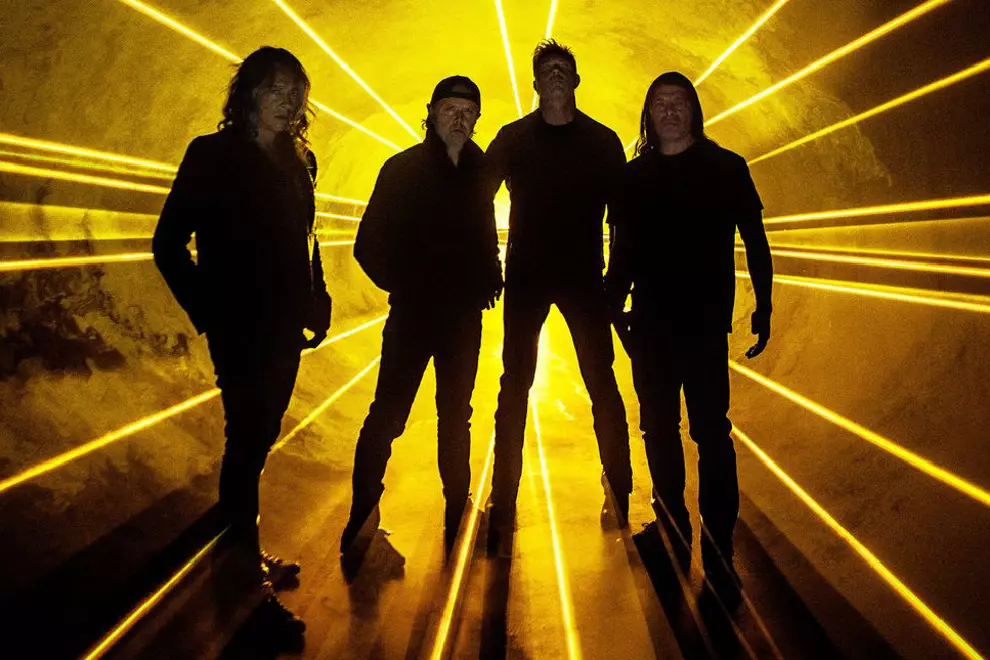 Metallica
MetallicaMetallica frontman James Hetfield has gone to rehab twice in his life: in 2001 to deal with the long-term impacts of alcohol addiction and childhood trauma; and in 2019, when he was feeling overwhelmed by the band’s touring lifestyle. Each time, the process has catalysed Metallica to a new creative level. First, there was the emotional purging of 2003’s St. Anger (disaster or misunderstood masterpiece?). And now, 72 Seasons, a record with more clarity of purpose than they’ve summoned in decades.
Every Metallica release is an event, especially this one - their 11th studio album and first in seven years. In Melbourne’s historic art deco Astor Theatre, a few dozen hardcore fans are buzzing with anticipation to witness the 72 Seasons Global Premiere in person. For the curious, the only exclusives to the cinematic presentation are the band’s intros and explanations between songs - everything else will already be streaming by the time you’re reading this. But it’s absolutely worth it for the collective atmosphere and to experience this 77-minute slab of heavy metal for the first time in such an overwhelming sensory setting.
The title track opens the album with what Rob Trujillo describes as “buzzsaw, grinding picked bass.” As it develops into a ferocious thrash riff, then the half-time variation that introduces the verse, the elements are familiar. But there’s a sense of grandeur in their delivery, even as James yells lines like “Feeding on the wrath of man! / Shot down, traumatic / Time haunted by the past!” - that feels utterly invigorating, even uplifting.
While 2016’s Hardwired… To Self-Destruct had clear highlights, for the most part, it felt like a paring-down of Metallica to their most barebones parts - not always for the better. 72 Seasons is not all that varied in palette, but surprisingly different in intent and execution.
Don't miss a beat with our FREE daily newsletter
More than any other Metallica album, 72 Seasons worships the art of the riff. There are no ballads and no clean guitars until the last six minutes of the album - a very deliberate choice. While their ’80s classics were intricately composed and arranged, and their ’90s albums more compact, 72 Seasons is absolutely packed with a series of riffs, counter-riffs and variations, to the point where they drive the songs even more than Hetfield’s vocals. Always his greatest foil, Lars Ulrich’s less-is-more approach to shaping those riffs hasn’t been this effective since St. Anger; it sometimes feels like he’s summoning the midpoint between Seven Nation Army and Black Sabbath.
Nowhere is that clearer on If Darkness Had A Son, which is so jammed with meathead riffs that it could double as Bray Wyatt’s WWE entrance theme. Elsewhere, there’s a strong pull from the New Wave of British Heavy Metal - the band’s formative influences like Diamond Head and early Iron Maiden - in the balance between melody, heaviness, and progression. Songs like Shadows Follow and Screaming Suicide sit between the straightforward Hardwired and the shreddy Death Magnetic - instantly memorable but needing several listens to fully appreciate their intricacies.
In the videos that accompany the album, two themes emerge. In the more abstract-leaning visualisers for Shadows Follow, Crown Of Barbed Wire, and Inamorata, there are countless panning shots of mountains, oceans, and cityscapes - often tinged with digital distortion. Room Of Mirrors is jaw-dropping - with a pixel-art mural by artist Eduardo Politzer, which vertically scrolls to reveal the band playing in a Hieronymous Bosch-like hellscape. This is the level on which Metallica are writing riffs - to channel a colossal, awe-inspiring sense of the world around us.
But they never lose sight of the human element, either. The music videos featuring the band themselves capture the sheer physicality of their playing, surrounded by light and colour. All in or approaching their 60s, they no longer play with the youthful, no-fucks-given rage of Binge & Purge: Seattle. In the intro segments, they talk about their challenges of keeping up their musicianship - James’ constant down-picking and Rob’s high-speed fingerpicking in Lux Æterna.
For most metal bands, aging would be a sign of weakness. To Metallica, it only makes their effort more meaningful. It is no small feat that they still sound tight, equally motivated by vigour and experience - and that Hetfield’s voice sounds stronger and healthier than it has since St. Anger, both live and in the studio.
Hetfield describes 72 Seasons as “The first 18 years of our lives that form our true or false selves… Much of our adult experience is reenactment or reaction to these childhood experiences. Prisoners of childhood or breaking free of those bondages we carry.” While that theme of psychological struggle drives almost every song, the lyrics themselves aren’t especially poetic - neither as creative as Puppets, nor as confessional as The Unforgiven or Mama Said.
As James sings on the epic 11-minute closer Inamorata, “Misery, she needs me / Oh, but I need her more… / Misery, she fills me / Oh no, but she’s not what I’m livin’ for” - the album the lyrics most resemble is… St. Anger. So too, is the way they arrange fairly straightforward riffs into lengthy, winding songs. In so many ways, 72 Seasons is the more hopeful mirror image of St. Anger. Hetfield’s embodying his deepest fears - this time, in order to dispel them.
Some will complain that there is a lot of low E-string chugging throughout. And yes, there is a familiar structure to many of the songs: extended intro, double-time riff, half-time riff into verse, pre-chorus modulation into a higher key; dual-guitar melodic bridge, Kirk Hammett solo that gets shredder and leaps up an octave after eight bars; and finally, ending with a brand-new riff. However, each of these songs feels distinct; they’re not reducible to formula because each heavy riff, each lyric, feels like an emotion they’ve fought for.
Four decades after they kicked the doors down in their early twenties with Kill ’Em All, Metallica have come full circle in a way that no one could have predicted. Lyrically, 72 Seasons is about how the struggles of one’s first 18 years can reverberate into adulthood. But musically, it’s about reconnecting with their earliest influences and finding new meaning in them once again - with no interest in simply recapturing past glories.
James Hetfield has often posed a question to the crowd at live shows: “How does it feel to be alive?” 72 Seasons responds with Metallica’s raison d’être: to chase their Lux Æterna, their light eternal, as long as the mind and body are willing.

















